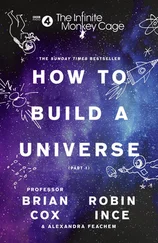“Ready,” he said. Then to ground: “MS-2, we are clear to proceed.”
“I hear you, Keith. Stand by.” Again silence. Then, “Here we go.”
And so here it was. He had designed the arm, had supervised its installation and had tested it repeatedly over the preceding weeks, but this was the moment where it would all come together at last. The sensation was clear and smooth and silent, the body of the ISS moving alongside him as the mechanism pushed him along the truss, open areas of darkness yawning up at him where the superstructure lay exposed and then disappearing under closed white panels reflecting sunlight. To his right, the distant blue ocean flecked with white clouds and to his left the endlessness of the stars, like images from a film or a still picture on the periphery of his vision, unreal, impossible, the white and black surface of the station and the crisscrossing beams of the truss flowing past him. Bisected boxes, planes and angles, all of which aligned in perfect symmetrical structure that was no less than a tangible, physical manifestation of the numbers themselves, so close he could have reached his gloved hand out and touched these things as his body passed them: this panel of the aluminum meteoroid shield, this padded trussbeam, this line of rivets, this long and beautiful machine.
The task itself was not unlike removing a huge dishwasher from between countertop and floor and cabinetry, the power driver in his gloved hand turning the bolts and stowing them in the bag again and again, Mission Control occasionally relaying instructions as he worked, the process tangible and solid and continuous, the bolts unscrewing from their housing, floating in the microgravity as he pawed them with his gloved hands, then transferring them to the mesh bag attached to his wrist. Then another. And another. As clear and straightforward as a simple equation: moving each variable to zero until the whole tank was free of its housing. Then at last he pushed his gloved hands through the scoops he had attached there and pulled his fingers tight against the handles. “OK, Mort, let’s pull this out nice and slow,” he said.
“Affirmative, EV-2,” Stevens said. “Slow and steady wins the race.”
He felt himself drifting back, the huge white block of the nitrogen tank coming with him in perfect and absolute silence, its five hundred fifty pounds rendered close to zero in the microgravity, the robotic arm pulling him backwards so that he was lifted up and away from the truss, away from the station itself, out into the plane that was parallel to Earth and was itself a kind of orbit, a parabola extending from yet another parabola which was no parabola at all but a circle.
“MS-2, we’re looking good here,” he said. “We’re just about clear of S1.”
And a moment later the tank was indeed clear, leaving behind a square gap where it had once been housed, the empty nitrogen tank a rectangular box the size of a refrigerator, held now by two simple handles gripped by his gloved fingers, his space-suited body standing straight and tall at the end of the robotic arm, his boots the only direct attachment to the machine he had designed to carry him.
“Ready to wipe some windshields?” Stevens said in his ear.
“Affirmative, MS-2. All ready here,” Keith said.
Then Stevens again: “EV-1, we are ready to proceed to ESP-3.”
And Eriksson: “Affirmative, Destiny. All clear.” Then to Keith: “Have fun, Chip.”
There was a brief pause and then he began to turn, slowly, the huge segmented arm twisting until he was tilted at a slight angle, the tank moving with him as the scene shifted in the helmet glass: the long stretch of the truss and the more distant Russian module and the radiators blazing in the sunlight and then the solar arrays and the whole of the ISS as he continued to move up and away from it all, the motion of his lifting and the distances below him seeming to shift as he watched. One zero eight-point-five, this line he moved along, the axis of the truss line crossing the modules at seventy-three meters and the point of motion that was himself and the full nitrogen tank he held in his outstretched hand, that point moving along the parabolic arc, mapped along a path he could see as if it existed only as a graph on a sheet of paper. One zero eight-point-five, each number before him, not just the total but the graduated divisions that marked off the measurements as if some enormous thermometer marked by regularly spaced red lines.
“How’s it look up there?” Stevens said.
He paused before answering. Then he said, “MS-2, visual clean and clear.”
“Yeah, but how does it look?”
“It looks …,” he said. Then he paused again. There were no words. The whole of the station like an enormous winged insect and the arm swinging him backwards above it so that the farthest reaches of the truss and the huge black rectangles of the solar arrays flashed and reflected their darkness to him, diminishing as he moved, knowing what was below even when he could not see it, as if points on a map or a grid, points denoted clearly and plainly by their coordinates. The names shuttled by — the Mobile Servicing System, the S0 truss segment and then the Unity Node, the Columbus Module, the Destiny Lab — objects named to denote the idea of their most perfect state of being, as if already clarified by their purpose or by the purpose they had been set forth to fulfill and all of them designed by other engineers, other mathematicians. He moved above them, pressing toward the apex of that motion where the parabolic curve would shift from zero to one, all of it visible now: the various modules where they clustered below him and the black mirrors of the solar arrays where they connected to the long crisscrossing trusses, each shape outlined and ringed in blue lines and arrows, the numbers circling and ringing and indicating and denoting their symbolic values. The numbers of the machine. The perfect machine.
Then Mort Stevens’s voice in his helmet: “You still with me, Keith?”
“Hang on,” he said. Then, “I wish … I wish you could see this. It’s amazing here.” Not even aware of whom he was addressing. He thought he would actually tear up, that he would actually cry. Not because of the mission or because he had accomplished everything he had set out to do but because what he could see in that moment was so stunning in its beauty and purity and complexity that it could not be believed. Everything within the angle of his vision rendered infinite. My god. Below him spun the bulge of South America where the brown and muddy Amazon emptied into the Atlantic and a swirl of clouds that ran under the Destiny Module like a dust mote swirling under a piece of furniture: green and brown continents and blue oceans and white clouds and above it all: the clear and precise white and black of the station and the robotic arm itself where it moved in umbilical perspective down to the Kibo Module, the ISS, those oxygen-filled tubes in which they worked and lived. And Keith Corcoran: floating above it all.
Already Earth returning to its forty-five minutes and thirty seconds of night as he moved in the orbit path, the coming of darkness like some lightning eclipse, and he pulled one hand free — not even thinking now, for perhaps the first time in his life completely without thought — and clicked off the light of his helmet and peered into the multicolored glow of space itself. All his life the numbers in his mind arrayed in some black substance that was this substance, this dark matter, and now here it was and he stood on a platform and was raised up into it as if into some pool that drifted not below him but above, his body cresting into that surface and breaking it and finding no numbers there whatsoever, instead only the stars, not on the flat dome of the night sky but actually in perspective and distance and in color and not a one of them twinkling or blinking but steady and solid and so clearly at different distances and sizes and locations and of varieties staggering to behold. A universe comprised of radiation and light and gravity and energy and mass. What equation to describe such a reckoning? What set of numbers? Only the dark matter and the resplendent and glorious universe itself spinning out all around him. Around us all.
Читать дальше












